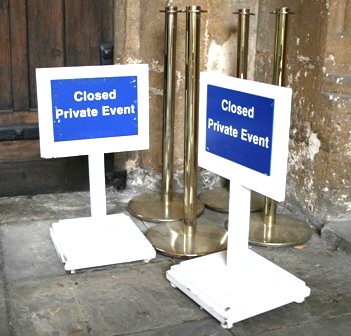
Wadham College prepares for The Leisure Review
Edition number 33; dateline 30 July 2010
The Leisure Review symposium: steaming against the tide
Interesting times beget interesting conversations. My first such was on the subject of the current political climate, the second regarding attitudes within the sport, leisure and culture sector, and the third about this sector’s response to the national priorities that the Con-Dem government has now made clear.
But perhaps that should read “has only now made clear” seeing as the government has now embarked upon a radical reinvention of the UK state in the image of a neo-conservative nirvana that was not mentioned in any manifesto or policy statement before or during the election. Just an oversight, I’m sure, just as the demand for outline proposals for 40% budget cuts across all departments of state are just the idle joshings of right-wing politicians during their down time. Now that we seem to be operating within a political system in which no party appears to be bound by anything other than expediency, and certainly nothing said or written during the process of getting elected, what, my first conversation wondered, does this mean for the Department for Culture, Media and Sport (and the Olympics)? The upshot is, according to my co-conspirator, that Secretary Hunt, the bright-eyed head of the government’s own leisure department, is rumoured to be discarding the advice of his junior minister in pursuit of the sunlit ideological high ground occupied by the prime minister and his band of tumescent Cameroonians (plus Nick Clegg). Secretary Hunt’s desire to be among the chosen has, it seems, made him an evangelist for the slash-and-burn approach to departmental process. I revisited The Leisure Review article from the July 2010 issue that introduced the new DCMS team and summarised their first statements. We noted the culture secretary’s promise from his first presentation in the job that “culture will not be singled out as a soft target”. And perhaps this promise has been kept, although it is of little comfort to find that the real meaning of the statement was that culture will be cut alongside everything else. Not a soft target but a target nonetheless.
My second conversation revealed that several senior figures within our sector have adopted an attitude that seems at odds with the general consensus of despair. While others fear for the future of sport, leisure and culture nationally, locally and conceptually, it seems at least a couple of our favourite leisure people are channelling Rahm Emanuel, President Obama’s chief of staff, whose watchword is to “never waste a good crisis”. By my conversational partner’s reckoning, times such as these are when the things get done; what is more, these are times when unusual or unexpected things can get done very quickly. The message seems to be that the game is afoot and, while it might be a dangerous game with exceptionally high stakes, for those who play the game well the rewards could be significant. And besides, my colleague remarked, no one in our sector can say they were not warned that this was going to happen sooner or later and if ever the sport, leisure and culture sector was going to find out whether all its arguments about economic impact and social capital hold water this is it.
With this exchange still fresh in my mind, came the third conversation, in which I heard someone suggesting that there should be an innovative and challenging event to bring together the leading lights of our sector to discuss and explore what a viable and sustainable sector might look like in the aftermath of the decimation (literally at least) of public spending. The only slight worry was that the suggestion was made at a TLR Communications board meeting and I was the one making it. Even more disturbing was that my colleagues were agreeing with me. And thus The Leisure Review symposium was pushed down the slipway. It represents something of a risk for us, not least emotionally, and it does seem at odds with the current tide of feeling but we are looking to the second conversation rather than the first as our lead. Now is the time to be standing by the claims and statements we have made over the years regarding the efficacy of what sport, leisure and culture does; now is the time for some mettle and some leadership to be shown. We accept, of course, that these are fine words when your budgets seem to be on fire and sinking at the same time, the professional bodies that purport to represent the sector remain steadfastly (and perhaps, in light of their recent achievements, thankfully) silent and the prospects of an outbreak of social responsibility in Westminster look bleak. Nor do we purport to be in any sort of position to offer leadership to the sector upon which we report and to which we like to think we make some sort of contribution. However, we are prepared to stick our heads above the parapet and we do know a lot of people who are well placed to provide leadership, ingenuity and vision. Our aim is to bring a small number of them together to have a serious discussion about how the sector might look in a brave new world.
At the time of going to press with this issue of The Leisure Review we’ve already signed up our first delegate. Another two or three and we’ll have a discussion. Add your name to the list and the sector could have a future.
Jonathan Ives
Editor
letter from the editor
The Leisure Review editorial
